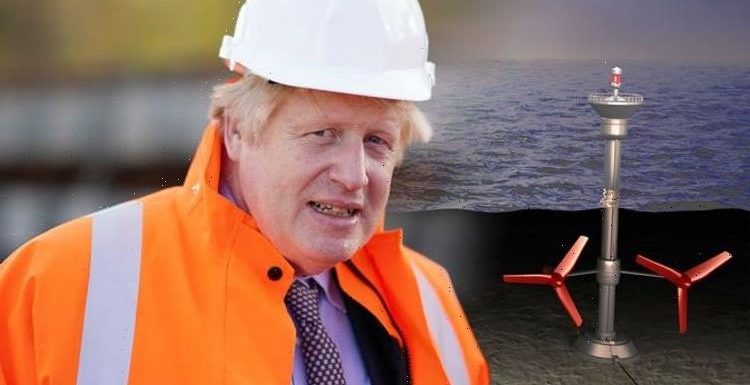
Net zero businesses could make '£160 billion profit' says Rose
We use your sign-up to provide content in ways you’ve consented to and to improve our understanding of you. This may include adverts from us and 3rd parties based on our understanding. You can unsubscribe at any time. More info
The Government has vowed to back tidal as part of its renewable energy auction scheme, which will help pave the way towards a net-zero economy by 2050. Although the UK is already a haven for offshore and onshore wind farms, ministers are hoping to diversify and strengthen the UK’s renewable energies market. Earlier last month the Government said all of the UK’s electricity would come from green sources by 2035.
The move is part of a wider effort to slash the UK’s planet-warming greenhouse emissions by 78 percent within the same timeframe.
Towards this goal, the Government has ringfenced £20million per year for Tidal Stream electricity.
The funding is expected to boost marine technologies in the sector and deliver hundreds of jobs and prosperity to the UK.
This will be done through the fourth allocation round of the Contracts for Difference (CfD) scheme, which is due to open next month.


CfDs are the Government’s primary way of encouraging investment in the green energy sector by incentivising the production of energy using low-carbon sources.
The £20million boost will bring the UK’s total funding for the fourth allocation round to a record £285million per year.
Business and Energy Secretary Kwasi Kwarteng said: “As an island nation we are perfectly placed to capitalise on clean marine energy, building on our booming offshore wind sector which is now a British industrial success story.
“We hope to see marine energy follow in the successful footprints of other renewable technologies, where we’ve seen costs fall dramatically in recent years thanks to UK government support.
“The investment today provides a major push for tidal power to become a key part of the next generation of renewable electricity projects needed to strengthen energy security as we work to reduce our dependency on volatile fossil fuels.”
Children's Parliament: Child calls for action to reach net-zero target
According to the Government, tidal energy has the potential to significantly slash the UK’s carbon emissions.
Much like a wind turbine, tidal energy uses the power of the seas to spin turbines that generate electricity.
Scientists, however, believe tidal energy is more reliable than wind because the tides are constant and predictable.
Advancements in the field are also making tidal tech more efficient and cheaper each year.
By including tidal in the UK’s “low-carbon energy mix”, the Government said the UK will be on track to meet its green commitments.


And tidal projects are presently underway in North Wales, Northwest Scotland and along the southern coast of England.
Energy Minister Greg Hands, said: “Our renewable energy auction scheme has been vital to the UK becoming a world leader in clean electricity generation and helping to bring down prices for consumers.
“Today’s dedicated backing for tidal stream power is opening up a new chapter for Britain’s coastal communities and advancing the possibilities for Britain’s marine energy sector to play a significant role in delivering the UK’s green industrial revolution
CfDs have already helped pump investment in the wind sector and have reduced the price of offshore wind by 65 percent.
The fourth round of the CfD will open on December 13.
Sue Barr, Chair of the UK Marine Energy Council, welcomed the announcement and praised the Government’s support.
She said: “This dedicated ringfence will secure our domestic market, support decarbonisation and will enable tidal stream energy to develop; delivering export opportunities, green jobs, and economic growth in the process.
“We are grateful to ministers and the broader UK government for having listened, understood and acted.
“This new support for tidal stream brings us one step closer to delivering a Great British success story that will provide both environmental benefits through the generation of renewable energy alongside UK-wide supply chain benefits.”
Source: Read Full Article